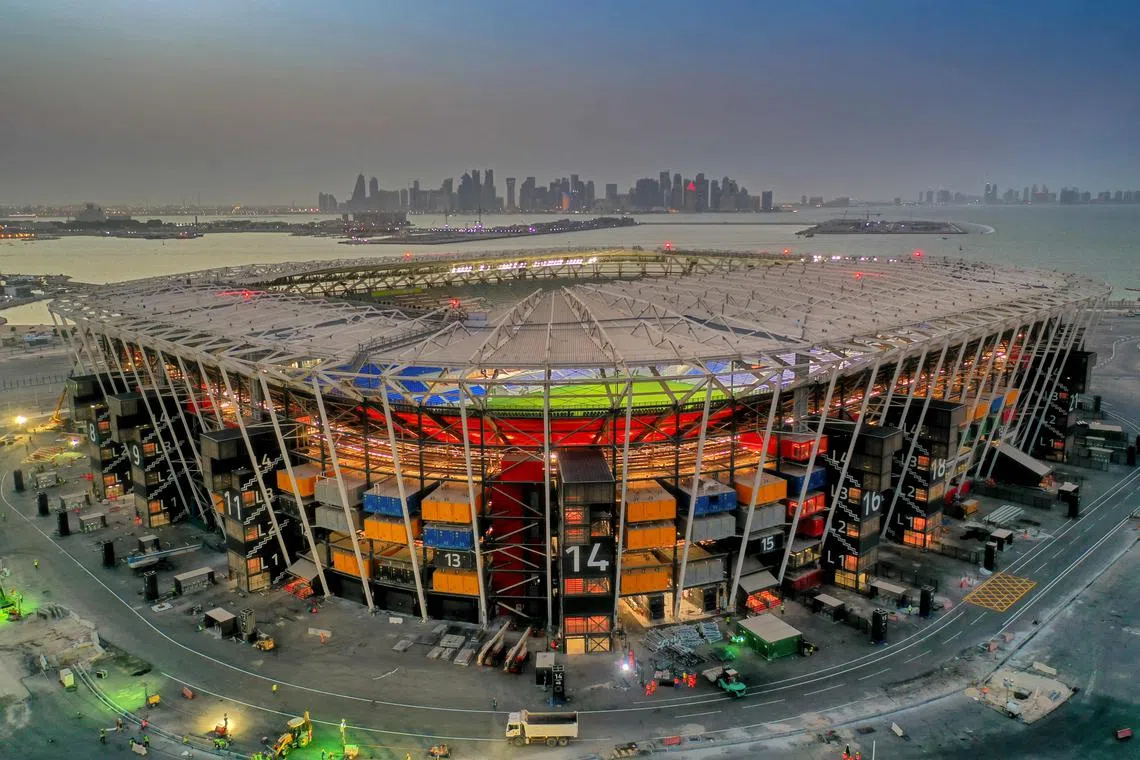World Cup: ‘Lego brick’ stadium symbolises Qatar 2022’s push for sustainability
Sign up now: Get the biggest sports news in your inbox

Stadium 974 is the only one of the eight venues not to require air-conditioning due to the natural breeze from the Arabian Gulf.
PHOTO: AFP
Follow topic:
At a glance, Stadium 974 does not look like a stadium at all. Overlooking the West Bay seafront in Doha, it in fact resembles the shipping terminals you would find along Pasir Panjang or Keppel Bay more than a sporting venue.
Sitting on a largely barren artificial promontory, the 40,000-capacity arena, a jumble of colours and 90-degree angles, may even appear like an enormous mirage to some.
In a way, it is. For it will disappear not too long from now.
Once the World Cup ends, Stadium 974 – the world’s first fully demountable football stadium and one of eight venues for matches in Qatar – will be taken apart and shipped abroad to be reassembled.
Named after the number of recycled shipping containers it incorporates – which also happens to be Qatar’s international dialling code – it will host seven games at the World Cup.
But organisers hope its impact will extend beyond simply being a stage for football matches and act as a lasting symbol of Qatar’s sustainability efforts.
Talar Sahsuvaroglu, senior manager for sustainability and environment with Qatar’s Supreme Committee for Delivery and Legacy, said that every step of Stadium 974’s construction was done with environmental considerations in mind.
Noting that the stadium was built where the former headquarters of Qatar Petroleum was located, she told visiting media, including The Straits Times: “When we demolished (the previous site), of course we had a lot of waste and we had to manage that sustainably as well.
“We were able to recycle about 80 per cent of everything we demolished, which is something not done very often.”
The market average for projects of a similar scale, Sahsuvaroglu added, was about 20 per cent.
Materials recycled for Stadium 974’s construction included metals, electronics and wood waste.
Almost 70,000 tonnes of concrete and asphalt were crushed, tested and stockpiled to be reused.
Groundwater on the site, which was contaminated due to previous industrial activities, was drained and then treated before being used for dust suppression during the construction process.
Stadium 974 stands out among the eight World Cup venues scattered across Qatar not just because of how it looks from the outside or that it is the only one without air-conditioning (planners say the breeze rolling in from the Arabian Gulf will sufficiently cool fans in the stands).
The facility is an ode to simplicity, almost an antithesis to the opulence and luxury often associated with the Arab world.
Players’ locker rooms look like they have been designed out of giant Lego bricks, while corrugated sheets and steel beams will greet fans when they walk through the stadium’s atrium next week.
These are features of a deliberate “industrial finish”, which is a nod to the site’s past, explained Stadium 974 director Mohamed Al Atwaan.
The site’s future, meanwhile, will see it transformed into a waterfront development boasting community and business facilities, after Stadium 974 is dismantled.
The facility can be reassembled elsewhere in its current form, at a downgraded 20,000 capacity, or repurposed as a series of smaller venues. Exactly where it is headed, however, is undecided.
Al Atwaan said there have been “a lot of requests” and “options are available on the table”, and North Africa and South-east Asia have been touted as destinations.
It could even become the first venue to feature in World Cups hosted by two separate countries, after it was mooted as a possible venue in Uruguay, as part of its joint bid with three other South American countries for the 2030 edition.
Match venues are not the only aspect of Qatar 2022’s sustainability strategy, which is laid out in five pillars, namely human, social, economic, environmental and governance.
But Stadium 974, said Sahsuvaroglu, is a “game changer” in paving the way for environmentally-sustainable approaches moving forward.
“Essentially, what we’ve done is set a new benchmark for all the major mega events to come,” she said.


